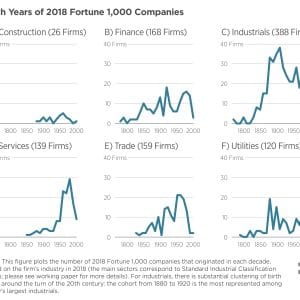WATCH VIDEO
Video by Sydney Turner
When research professional Jialing Zhang became intrigued by Adam Smith’s invisible hand theory, she didn’t know it would shape her academic path and future career in research. That early curiosity with how self-interest can generate societal benefit led her to BFI’s Predoctoral Research in Economics Program (PREP), and she is now headed to Princeton to pursue a PhD in economics.
“People say math is the language of the universe, and I think economics is the language of human lives,” Zhang said. “I wanted to understand how money flows between individuals, businesses, and governments, and how all these interactions build a society.”
After studying agricultural economics and completing her undergraduate degree at the University of Maryland, Zhang earned a master’s degree in econometrics and mathematical economics at the London School of Economics. But when it came time to pursue a PhD, she realized she needed more hands-on research experience.
Through PREP, Zhang joined a data-driven project under the mentorship of UChicago’s Esteban Rossi-Hansberg, focused on estimating GDP for developing countries where data is sparse.
“Jialing was an excellent research professional,” Rossi-Hansberg said. “She was thorough, capable, and effective. I think the BFI PREP program was an extremely useful experience that prepared her well for her PhD studies in economics.”
The project combined machine learning with spatial economics to build models that could predict economic indicators in regions that lacked reliable official statistics. That process was anything but smooth. Through trial and error, a pattern started to emerge, which turned into an interactive tool on BFI’s Data Studio that can be used by anyone.
“I didn’t know anything about spatial economics when I started,” she said. “But it turned out to be an amazing opportunity to explore. I’d spend days writing algorithms to test hypotheses.”
Zhang is now preparing to begin her PhD in economics at Princeton — an outcome she attributes in large part to the opportunities and support she found at UChicago.
“The PREP program speaks for itself,” she said. “So many students here get into top programs. But more than that, it felt like a community that makes sure you’re not just academically supported, but also mentally and emotionally.”
Though her future research will likely explore new questions, perhaps climate change or international trade, Zhang sees her recent work as a powerful tool she may return to.
As her time in Chicago comes to a close, what Zhang will miss most about the city include bike rides along Lake Michigan, and her mission to try and rank every hot pot restaurant that she could fit in time to visit.
Her advice to incoming research professionals:
“Just enjoy life here. This program works, and you’ll end up where you need to be. Don’t be too stressed. Learn, explore, talk to brilliant people. You’ll be amazed by what you discover.”
From her office where she shared ideas with colleagues from around the world to late nights debugging code that might never work, Zhang’s PREP experience has been about more than research. It’s been about finding her voice, building confidence, and joining a global conversation on the future of economics.












